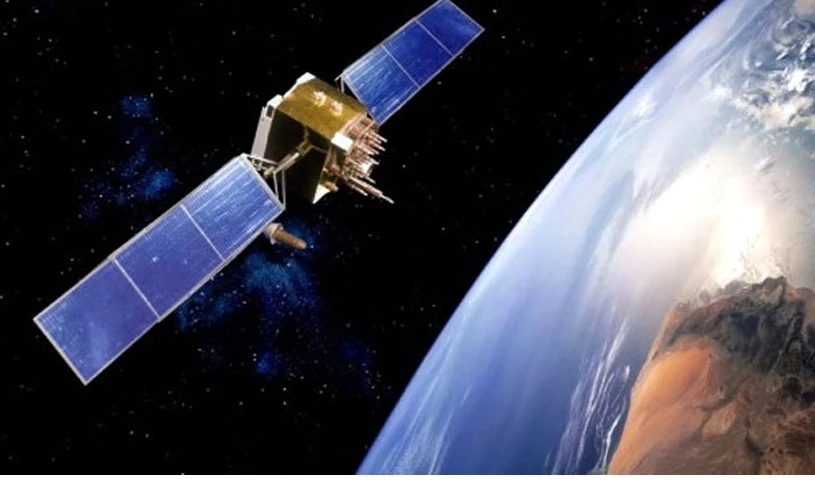Pakistan launched multi-mission communication satellite today

Stay tuned with 24 News HD Android App

Pakistan Space and Upper Atmosphere Research Commission Thursday successfully launched a new multi-mission communication satellite PakSat MM1 from Xichang Satellite Launch Centre in China, reported 24NewsHD TV channel.
The satellite, launched from China's Xichang Satellite Launch Center (XSLC), will help usher Pakistan into the digital era by helping to provide internet to remote areas, the Space and Upper Atmosphere Research Commission (Suparco) said.
The satellite — which will take around four days to reach space — is expected to contribute to the establishment of a sophisticated communication network and help meet the growing demands of the telecom sector and its advanced capabilities will address the increasing demand for high-speed internet and seamless connectivity.
The satellite PakSat MM1 has been conceived keeping in view the growing needs of the country in the broad spectrum of communication and connectivity.
Based on advanced communication technologies, PakSat MM1 will play a pivotal role in the socio-economic uplift of the country and will prove to be a stepping stone in the transformation of the country into Digital Pakistan.
The satellite launch will be in accordance with the National Space Programme 2047.
Prime Minister Shehbaz Sharif congratulated the nation on the satellite's launch, hoping it would help provide the fastest internet facility throughout the country.
"I am particularly excited about the potential impact of Paksat MM1 on internet connectivity across Pakistan," the premier said in a statement.
The prime minister said that Paksat MM1 would not only enhance the lives of Pakistani citizens but also contribute to the promotion of economic activities, e-commerce, and e-governance.
Acting President Syed Yusuf Raza Gilani has also congratulated the entire nation on the successful launch of Pak MM-1 communication satellite. The President appreciated the efforts of all the scientists and engineers.
Gilani said that Pakistan will benefit from better communication connectivity with the launch of this satellite and this key achievement will set new standards of development.
Project Director PakSat MM1 M Imran said before the launch: “Our team is very excited for the upcoming launch of PakSat MM1 on May 30”.
This satellite project is a hallmark of technological cooperation between the People’s Republic of China and Pakistan and is expected to revolutionise communication in Pakistan and serve as a giant leap towards a digitally connected Pakistan.
The launch was shown live for media from Islamabad and Karachi establishments of Suparco.
The satellite is expected to contribute to the establishment of a sophisticated communication network and help meet the growing demands of the telecom sector and its advanced capabilities will address the increasing demand for high-speed internet and seamless connectivity.
Suparco says “This high-power multi-mission satellite will provide communication services in C, Ku, Ka Bands and SBAS services in L Band. Based on advanced communication technologies, PakSat-MM1 will play a pivotal role in the socio-economic uplift of the country. It will prove to be a stepping stone in the transformation of the country into Digital Pakistan. It will provide various communication services like broadband internet, TV broadcasting, Mobile bank –hauling and VSAT connectivity”.
Project Manager MM-1, Suparco, Usman Iftikhar, said that the primary objective behind the PakSat MM-1 satellite is to strengthen Pakistan’s communication infrastructure would pave the way for broadening the horizons for connectivity, serving the unserved, Tele-education, E-health/Tele-medicine, E-governance and E-commerce while transforming Pakistan into a digital powerhouse.
He said that communication infrastructure is the backbone of any country and plays an important role in the development of the country and this satellite will help provide connectivity to the remote areas of the country. This satellite is a communication satellite that will be sent in a Geostationary Orbit.
Earlier, Pakistan’s historic lunar mission (ICUBE-Q) was launched on May 3 on board China’s Chang’E6 from Hainan, China.
The satellite iCube-Qamar mission marked Pakistan’s first lunar exploration effort which is a significant milestone for the country’s space endeavours.
The satellite iCube-Q was designed and developed by the Institute of Space Technology (IST) in collaboration with China’s Shanghai University SJTU and Pakistan’s national space agency Suparco. The satellite, weighing about 7kg, was developed by the Electrical Engineering Department of the Institute of Space Technology (IST) in Islamabad.
The satellite successfully captured and transmitted its inaugural images from lunar orbit, providing a unique perspective of the moon’s surface.
Regarding the benefits of satellites, Suparco said that satellites play a vital role in improving communication, enhancing navigation, monitoring the environment, advancing scientific knowledge, and supporting various aspects of daily life, making them indispensable for humanity’s progress and well-being.
Satellites are incredibly beneficial for humanity in communication, navigation, weather forecasting, earth observations, scientific research, disaster management, remote sensing, and telemedicine.
Three types of satellites are required for any country, firstly for communication, secondly for remote sensing and reconnaissance, and thirdly for navigation.
